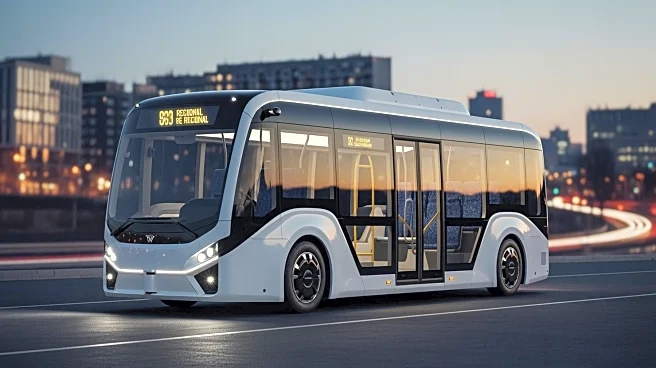What's Happening?
Isuzu Motors is conducting demonstration tests of its ERGA EV autonomous bus in Hiratsuka City, Kanagawa Prefecture, from October to January 2026. The bus, which features a 242kWh lithium-ion battery and a maximum output of 250kW, can accommodate 68 passengers
including the driver. The world premiere of the bus will occur at the Japan Mobility Show 2025 in Tokyo. This initiative is part of a collaborative agreement aimed at promoting digital transformation in regional transportation, focusing on autonomous mobility. The collaboration includes Hiratsuka City, Kanagawa Chuo Kotsu, Mitsubishi Corporation, Aisan Technology, and A-Drive. Previously, Isuzu conducted Level 2 autonomous driving tests with a driver on board using its ERGA diesel vehicle along existing bus routes in Hiratsuka. The current tests involve the ERGA EV autonomous bus, with plans for nighttime operations and cashless fare payment.
Why It's Important?
The testing of the ERGA EV autonomous bus represents a significant step towards integrating autonomous technology into public transportation systems. This initiative could lead to more efficient and sustainable urban mobility solutions, reducing reliance on fossil fuels and enhancing passenger convenience through features like cashless payments. The collaboration between multiple stakeholders highlights the importance of partnerships in advancing technological innovations in transportation. Successful implementation could serve as a model for other cities, potentially transforming public transit systems across Japan and beyond. The project also underscores the growing trend of digital transformation in transportation, which could have wide-reaching implications for urban planning and environmental sustainability.
What's Next?
The demonstration tests will continue until late January 2026, with general public test rides planned during the Level 2 self-driving test period. If successful, the initiative could pave the way for broader adoption of autonomous buses in Hiratsuka City and potentially other regions. Stakeholders involved in the project may explore further enhancements to the autonomous driving technology and expand the scope of operations. The results of these tests could influence future policy decisions regarding autonomous vehicles and public transportation infrastructure. Additionally, the project may attract interest from other cities and transportation companies looking to implement similar technologies.
Beyond the Headlines
The deployment of autonomous buses raises important ethical and legal considerations, such as passenger safety and data privacy. Ensuring the reliability and security of autonomous systems is crucial to gaining public trust and regulatory approval. The initiative also highlights the cultural shift towards embracing technology-driven solutions in everyday life, which could lead to changes in how people perceive and interact with public transportation. Long-term, the success of such projects could contribute to reducing traffic congestion and lowering carbon emissions, aligning with global sustainability goals.
















